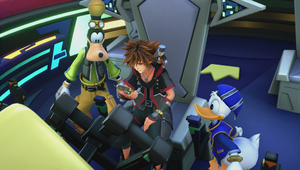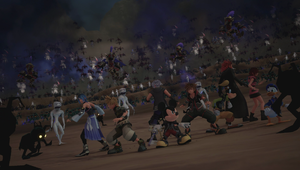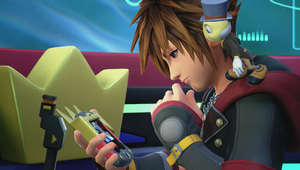Opinion:How the Cloud Versions of the Kingdom Hearts series work (or don't)
The ideas expressed in this article are the express opinion of the author(s), and do not necessarily express the opinion of the Kingdom Hearts Database, its staff, or its contributors collectively.
With so few positive experiences so far, it's unlikely that Square Enix's recent port of the beloved Kingdom Hearts series will be successful.
In the latest step in Square Enix's recent trend of plugging the Kingdom Hearts series in every platform currently available, the Kingdom Hearts series is set to be released on the Nintendo Switch on February 10, 2022.[1] That's still about one week out, and yet the impending release is already facing a level of backlash and resistance unseen in the previous recent ports of the series. One important change this time around is that the games will not be available natively on the portable console. Instead, marking a first for the series, the games will be releasing as three compilation titles available via Nintendo's Switch Cloud Gaming service.[2] There are demos now available for the titles on the Nintendo e-Shop. And so far, the public reception has been poor. Reports of input lag and latency abound, and the demos are incredibly short, at only ten-minute playthroughs of the games themselves. With cloud gaming a still relatively recent technology and many hoping for native ports of the titles even before the October announcement that they would be arriving on the Switch, it's worth considering how cloud gaming works and why the Kingdom Hearts series is releasing as cloud titles in the first place.
What is Cloud Gaming? How does it work?
First, let's discuss what cloud gaming is. Cloud gaming is supposed to allow you to stream games over the internet to your devices just as you currently can do with video streaming services such as YouTube, Netflix, and Disney+. The games are run remotely on servers in datacenters miles away from your location, making it possible for you to stream and play on your phone, tablet, PC, phone, or TV.[3] As such, it effectively eliminates the need to buy expensive (and for now, often scarce) consoles and gaming PCs. Cloud gaming has existed for a while now; in fact, PlayStation's parent company Sony purchased two of the early startups in cloud gaming, Gaikai and OnLive. Their technologies and patents currently power the PlayStation Now service, which is a cloud gaming service,[3] albeit not a particularly popular service.
So why is cloud gaming taking off? As mentioned, it eliminates the need to have to spend on a dedicated console or PC, a particularly crucial point right now with the worldwide chip shortage and scalpers making some of those devices difficult to find or buy. In theory, you can play on existing devices such as your phone, PC, or tablet. Since the games are housed in the service's datacenters, the updates would be applied there, eliminating the need to wait for a game to download and install updates whenever those are pushed before being able to play. Depending on the company's servers, cloud gaming can also reduce load times in games. Having said all that, there are two major problems with cloud gaming, as explained by tech news publication The Verge: how companies make money off cloud gaming services, and the fact that your gaming experience is now governed by your internet service. In the United States, for example, internet access is not consistent across the country, and depending on where you are located, you may not have a good enough signal to stream games from the cloud. Additionally, how cloud gaming companies make money from these services has been scattershot, ranging from letting your purchase timed tickets to subscriptions.[3]
Given all that, how is cloud gaming going? I opted to look at reviews for Xbox Cloud Gaming as it's the most well-known cloud gaming service. The rest in the industry are smaller scaled, just starting, or, in Google Stadia's case, not catching on very well. Gaming publication IGN reviewed the service in June 2021 and said at the time that the service has stable connections but long loading times.[4] On mobile platforms, the cloud titles register input quickly, but there is still artifacting and visual latency. Overall, the service appears to be a solid experience, but with plenty of deficiencies caused by the current state of the technology.[4] Despite Google's general failure to catch on, reviews of its Stadia service offer much the same result regarding latency and experience.[3]
How does Cloud Gaming work on the Nintendo Switch?
In 2016, Japanese cloud-gaming company Ubitus was revealed to be among a series of partners for the Nintendo Switch.[5] Ubitus has been part of the cloud gaming industry since at least 2012, and is a white-label cloud gaming service, meaning it offers its technology and services to other companies and lets those companies put their own brands or names on the service and call it their own.[6][7] This means that, in Nintendo's case, its cloud titles are run on Ubitus's servers, not on Nintendo's. By 2018, Ubitus had released SEGA's Phantasy Star Online, Capcom's Resident Evil 7: Biohazard, and Ubisoft's Assassin's Creed Odyssey.[8] Regarding Assassin's Creed Odyssey, an interview done by Famitsu in 2018 with Ubitus's Director of Game Development Ko Midoro and SVP of Global Business Development Ozan Kocoglu reveals that there were no issues with response times or lag with that title while using both a 5GHz Wi-Fi connection and a 4G cellular connection.[8]
The Verge reviewed Nintendo's cloud gaming service, powered by Ubitus, in 2019 with Assassin's Creed Odyssey.[9] At the time, they reported that the service was responsive, had no unpredictable lag, and felt like playing a title on a PS3 with uneven frame pacing. The image quality was not that great, with the quality breaking down in dark scenes or if moving quickly, with comparisons drawn to that of watching a Twitch stream. However, it's worth mentioning that this is all based in Japan, as Assassin's Creed Odyssey never released outside of Japan via cloud gaming. Additionally, the pricing was described as "nuts", which appears to be a continuing problem with cloud gaming on the Switch. Both Xbox Cloud Gaming and Google Stadia charge a monthly subscription for access to a library of titles. The Nintendo Switch's cloud gaming service, on the other hand, charges per title. For Assassin's Creed Odyssey in 2018, Nintendo was charging $80 USD for a 730-day game ticket. In other words, after two years, the title would no longer work. This brings up one of the potential drawbacks for cloud gaming, made worse by this charging model. The titles you play on any of these services don't belong to you and could disappear at any time just as your favorite TV shows and movies may disappear from Netflix or Hulu at any time. That makes it hard to justify paying nearly full price for these titles.
Remedy Entertainment released Control: Ultimate Edition – Cloud Version on the Nintendo Switch in 2019, the first cloud title to release on the Switch outside of Japan.[10] The title sold for $39.99 for an access pass but required a 5-minute network test before players could purchase it. Thumbsticks tested the title and said at the time that it performed remarkably well but is not the best option if you have access to the game on another platform.[11] In 2020, Square Enix released Marvel's Guardians of the Galaxy – Cloud Version for the Nintendo Switch.[12] Nintendo Enthusiast reviewed that version, saying it was playable, but inconsistent regardless of whether it was docked with Ethernet or over Wi-Fi. Ultimately, they said that they would not recommend it over the standard version.[13]
What does this mean for the Kingdom Hearts series on cloud gaming and the Nintendo Switch?
The February 10 release of the Kingdom Hearts series on the Nintendo Switch is a tale of two different platforms. On the one hand, the series will be releasing for the first time on the Nintendo Switch. On the other hand, it will also be releasing for the first time on a cloud gaming platform. This means that, as we analyze on a new platform, we're seeing two different platforms work together, and any problems could be in the hands either of these two companies or both, in addition to Square Enix.
For starters, let's consider why the series is even releasing on Ubitus in the first place. At this time, it doesn't appear that Square Enix is interested in investing the resources required to create a native port of any or all the Kingdom Hearts series on the Nintendo Switch. During the development and marketing for Kingdom Hearts Melody of Memory, Nintendo Enthusiast asked series director Tetsuya Nomura about releasing the rest of the series on the Nintendo Switch. To this, Nomura reportedly revealed that they had attempted to do so and found it technically difficult.[14] It's likely not impossible to port the titles over, so why not invest the resources? We'd be speculating at this point, but it's possible that those resources required for a full native port of the series may be tied up on the next title in the series, creating a question for fans: would you prefer to replay the existing titles on a new platform or get the next entry in the series? On the other hand, it's possible that it really is just technically difficult or impossible to port the titles to the Nintendo Switch. Contrary to widespread belief, I don't think this would be about porting PlayStation 2 and PlayStation Portable titles to the Nintendo Switch, after all; it's about porting PlayStation 4 titles to the Nintendo Switch. Some have suggested splitting the HD ReMIXes into the individual games, or porting from the PS2 and PSP titles directly to the Switch. Again, this takes resources and time, not to mention the infamous fun fact that the original PS2 data for Kingdom Hearts Final Mix is missing, requiring the game to be rebuilt again. And while I'm not a game developer, I assume all of these details makes a difference in deciding what to do to make these titles available on the Switch.
Additionally, Square Enix likes to experiment with emerging and popular new technologies. The company was one of the first to rerelease titles via cloud streaming; for example, it released Final Fantasy XIII on iOS in 2013 via a different cloud streaming service.[15] Even now, for better or worse, Square Enix is publicly toying with researching and investing in blockchain and metaverse technologies for future games.
One other reason Square Enix might be comfortable with the upcoming cloud releases? According to The Verge's 2019 review of Nintendo's cloud streaming service, fast internet service in Japan is more ubiquitous than it is in the United States.[9] Square Enix may be playing into its long-documented habit of playing to the strengths of its home turf in Japan. Of course, this just points to a different issue of the company preferring or focusing its attention to experiences in Japan, a subject I've already written about a few times as it relates to this series. As of this time, however, I've not found anyone to report on their experience with the Kingdom Hearts cloud demos in Japan, so it's hard to know whether that's made a difference.
Since none of us work for Square Enix, it's hard to know what exactly has led to the decision to release the Kingdom Hearts series on Nintendo Switch via cloud gaming. Personally, I didn't believe the series would ever arrive on the Switch, so the fact it's releasing on the Switch at all is a surprise for me. Even though I don't have a Switch, I can see how some people may feel cheated with this release. Despite major advancements in the industry, Nintendo's cloud gaming service powered by Ubitus does not appear to hold up as well as other services. Additionally, its pricing model is hard to justify for games that could just disappear in a year or two. Without native ports or the cloud version on other services, it's hard to definitively conclude if the issue lies with the Nintendo Switch or its cloud streaming partner Ubitus. It's worth noting that while this isn't the first time a cloud title has been discouraged, these issues aren't plaguing Microsoft's Xbox Cloud Gaming or Google's Stadia experiences. What definitely appears to be true is that with so few positive experiences via the demos so far, it's unlikely that Square Enix's recent port of the beloved video game series will be successful, an unfortunate disaster for the series as it heads into its 20th Anniversary celebrations.
References
- ↑ Kingdom Hearts Database: "Cloud versions of Kingdom Hearts series set to release February 10"
- ↑ Kingdom Hearts Database: "Square Enix and Disney Announce Beloved Kingdom Hearts Collections Coming to Nintendo Switch via Cloud" (Archived January 18, 2022)
- ↑ 3.0 3.1 3.2 3.3 The Verge: "What is cloud gaming? Google Stadia and Microsoft xCloud explained"
- ↑ 4.0 4.1 IGN: "Xbox Cloud Gaming Review"
- ↑ The Verge: "Activision, EA, Bethesda, and more pledge support for Nintendo Switch"
- ↑ The Verge: "Ubitus GameCloud: the white-label cloud gaming service seeking a US audience"
- ↑ Wikipedia: "White-label product"
- ↑ 8.0 8.1 Nintendo Everything: "Meet Ubitus, the company behind Switch's cloud-powered games"
- ↑ 9.0 9.1 The Verge: "The Nintendo Switch in Japan offers a peek at the cloud gaming future"
- ↑ The Verge: "Control is coming to the Nintendo Switch today, but you can only stream it from the cloud"
- ↑ Thumbsticks: "More massive games are coming to Nintendo Switch cloud streaming"
- ↑ Ubitus: "Ubitus support SQUARE ENIX to launch Marvel's Guardians of the Galaxy: Cloud Version on Nintendo Switch" (News Release)
- ↑ Nintendo Enthusiast: "Marvel's Guardians of the Galaxy: Cloud Version review for Switch"
- ↑ Nintendo Enthusiast: "No more Kingdom Hearts games planned for Switch, but other Nomura games possible"
- ↑ Digital Trends: "Final Fantasy XIII Now Streaming To iOS, Android In Japan"



